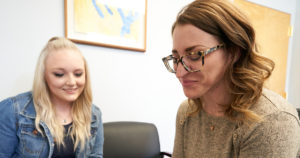Opioid addiction: The road to recovery
By Robin Govanlu, Director of Behavioral Health, Oak Orchard Health
When people think of substance use, they typically associate it with having fun and feeling good, however, once an individual crosses over to a state of physical and psychological dependency on that substance, they’re no longer chasing a high—they’re avoiding the agony of withdrawal. Substance Use Disorders (SUD) are a global epidemic; taking countless lives and leaving families and communities to grieve in the wake of those losses. Substance use disorders come in many forms and impact us all, whether you are the individual using or a loved one, friend, or community member, it touches all of our lives in one way or another.
Navigating an opioid use disorder (OUD) is a challenging road for our patients. If it were easy, no treatment programs would exist.
There are many roads to recovery.
When it comes to opioid use disorders, some find support through community programs like Narcotics Anonymous, SMART Recovery, or fitness-based recovery groups, while others start their recovery journey in therapy or find another pathway. Therapy for substance use disorders is effective and supports the healing of underlying trauma and mental health symptoms that contribute to use.
Beyond that, many individuals get support in their recovery through Medication Assisted Treatment (MAT), which involves taking a medication to manage withdrawal symptoms and reduce cravings to use. MAT includes medications like Methadone, available at specialty treatment programs, and other medications like Buprenorphine and Naltrexone, which can be prescribed at a doctor’s office.
 Let’s talk about MAT.
Let’s talk about MAT.
The stigma around substance use disorders prevents people from getting help. At Oak Orchard Health, we consider SUD a chronic medical condition just like any other. Part of our treatment approach at OOH is recognizing that those struggling with a SUD deserve respect and compassion in their care.
Medication Assisted Treatment, or MAT, can help people struggling with opioid use disorder because these medications are backed by research to be safe, and they help people reach their recovery goals to meaningfully live their lives again.
MAT can lessen the damage caused by SUD. This is called harm reduction—the idea that keeping people as healthy as possible and preventing their death is a step in the right direction, even if it doesn’t immediately solve every problem.
Where Oak Orchard Health comes in.
Oak Orchard works closely with specialty substance treatment providers in the community, including programs like GCASA (The Genesee/Orleans Council on Alcoholism and Substance Abuse), Strong Recovery through the University of Rochester, and others, to help clients get connected to the level of care that they need.
What We Offer:
We have many providers at OOH who are able to prescribe medications for substance use disorders, such as Buprenorphine and Naltrexone. In our setting, patients who have achieved stability in their recovery and are on a therapeutic dose of their medication from a specialty treatment provider can be given a referral and transferred to one of OOH’s licensed providers for ongoing medication maintenance. We are an important part of the substance care continuum as we pick up where specialty treatment ends; we support patients with MAT as long as they need it and can receive the rest of their medical care.
A holistic approach to treatment.
Whatever type of treatment patients receive, one of the most powerful ways to support their recovery is to see them as a whole person. Every day our staff at OOH take steps to screen for substance use, help patients get connected to services, and remember the importance of not shying away from talking about behavioral health issues.
Oak Orchard Health takes a supportive role alongside our clients during the maintenance stage of their recovery. And while we know most patients’ goal is to never have a return to use, if something does happen down the road, we are here to help them get the support and services that they need.
If you or someone you know is struggling with substance use or have questions about MAT at OOH, contact our Behavioral Health Care Manager at (585) 637-3905 ext. 2102.
